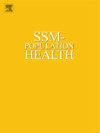欧洲不同福利制度下的丧子之痛、离婚和老年抑郁情绪
IF 3.6
2区 医学
Q1 PUBLIC, ENVIRONMENTAL & OCCUPATIONAL HEALTH
引用次数: 0
摘要
众所周知,丧亲(尤其是丧子)是短期内影响心理健康的风险因素,但对于丧亲对老年抑郁情绪的长期影响以及不同福利制度下的丧亲对抑郁情绪的影响,研究较少。本研究的重点是丧子和离婚对抑郁症状的综合影响,在中欧、北欧、南欧和东欧国家使用 EURO-D 量表进行测量。我们使用的数据来自欧洲 SHARE 项目,涵盖 22959 名 50 岁以上的参与者,历时 16 年。通过 OLS 回归,我们发现,与未失去子女和未离婚相比,抑郁症状与失去子女之间的关系显著(β = 0.22,95% C.I. = [0.13, 0.30]),男女均是如此。如果考虑到失去子女和离婚的相互影响,绝对值的增加则更为明显(β = 0.34, 95% C.I. = [0.18, 0.48])。通过使用广义估计方程,我们发现与离婚有关的抑郁症状并没有随着时间的推移而增加,无论过去是否有过丧子之痛。与北欧国家的人相比,生活在南欧的人与丧子和未离婚有关的抑郁症状较多,但与丧子和离婚的综合影响有关的抑郁症状较少。总之,我们的研究结果表明,丧子之痛可能会导致老年男性和女性出现更多的抑郁症状,尤其是在与离婚同时发生的情况下。在后一种情况下,我们认为生活在南欧国家的参与者可能会通过家庭纽带或非正式社会网络获得更多的社会支持。本文章由计算机程序翻译,如有差异,请以英文原文为准。
Bereavement due to child loss, divorce, and depressive mood in older age across European welfare regimes
While bereavement, particularly the loss of a child, is a well-known risk factor for mental health in the short term, its long-term consequences on depressive mood in old age and across different welfare regimes have been investigated less. This study focused on the combined role of child loss and divorce on depressive symptoms, measured using the EURO-D scale in Central, Nordic, Southern, and Eastern European countries. We used data from the European SHARE project, covering 22,959 participants aged 50+ over a 16-year period. Using OLS regressions, we found that, compared to no child loss and no divorce, the association between depressive symptoms and child loss was significant ( = 0.22, 95% C.I. = [0.13, 0.30]), among both women and men. The absolute increase was even stronger when the mutual effect of child loss and divorce was considered ( = 0.34, 95% C.I. = [0.18, 0.48]). Employing Generalized Estimating Equations, we found that depressive symptoms related to divorce did not increase over time, regardless of past bereavement. Compared with people in the Nordic countries, those living in Southern Europe experienced more depressive symptoms related to child loss and no divorce, but fewer depressive symptoms related to the combined effect of child loss and divorce. In sum, our findings indicate that bereavement due to child loss may lead to more depressive symptoms among both women and men in old age, especially in combination with divorce. In the latter case, we posit that participants living in Southern European countries may be protected by higher levels of social support through family ties or informal social networks.
求助全文
通过发布文献求助,成功后即可免费获取论文全文。
去求助
来源期刊

Ssm-Population Health
PUBLIC, ENVIRONMENTAL & OCCUPATIONAL HEALTH-
CiteScore
6.50
自引率
2.10%
发文量
298
审稿时长
101 days
期刊介绍:
SSM - Population Health. The new online only, open access, peer reviewed journal in all areas relating Social Science research to population health. SSM - Population Health shares the same Editors-in Chief and general approach to manuscripts as its sister journal, Social Science & Medicine. The journal takes a broad approach to the field especially welcoming interdisciplinary papers from across the Social Sciences and allied areas. SSM - Population Health offers an alternative outlet for work which might not be considered, or is classed as ''out of scope'' elsewhere, and prioritizes fast peer review and publication to the benefit of authors and readers. The journal welcomes all types of paper from traditional primary research articles, replication studies, short communications, methodological studies, instrument validation, opinion pieces, literature reviews, etc. SSM - Population Health also offers the opportunity to publish special issues or sections to reflect current interest and research in topical or developing areas. The journal fully supports authors wanting to present their research in an innovative fashion though the use of multimedia formats.
 求助内容:
求助内容: 应助结果提醒方式:
应助结果提醒方式:


